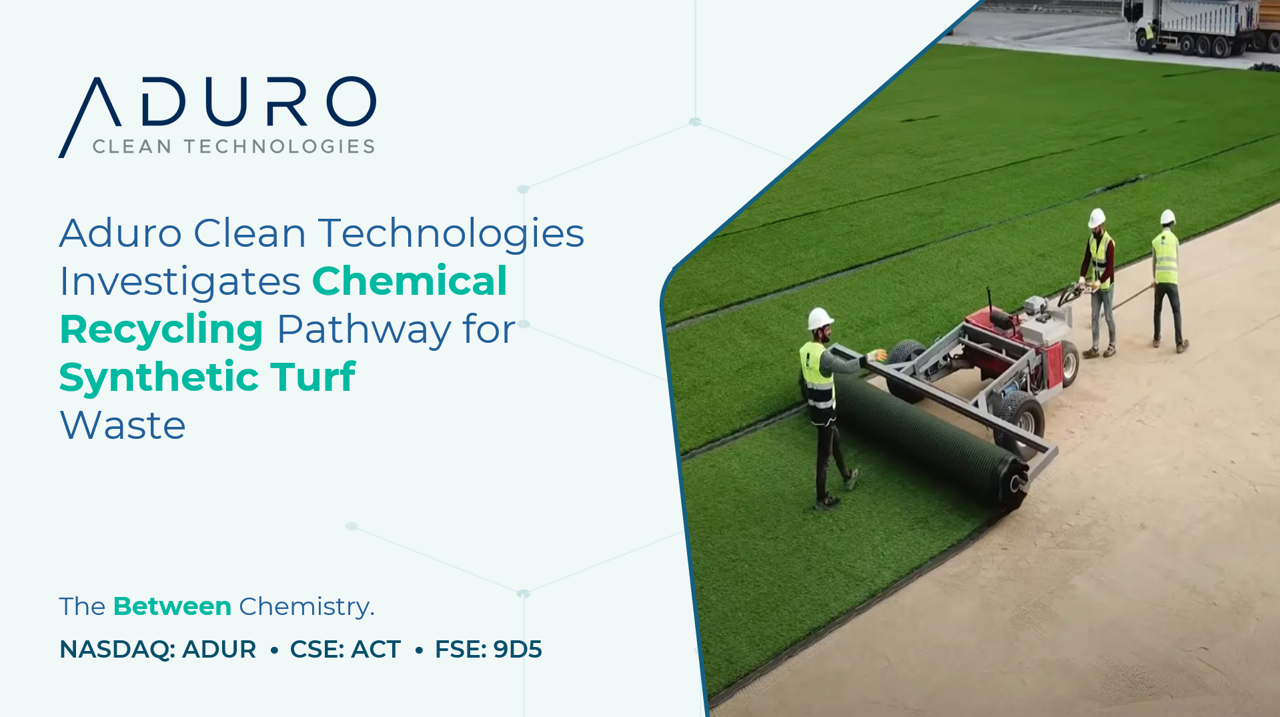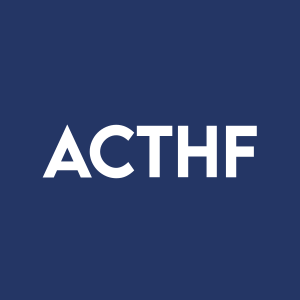Aduro Clean Technologies Investigates Chemical Recycling Pathway for Synthetic Turf Waste
Rhea-AI Summary
Aduro Clean Technologies (NASDAQ: ADUR) has successfully completed initial testing of synthetic turf waste using its proprietary Hydrochemolytic™ Technology (HCT). The company's chemical recycling process effectively converted polyolefin components from complex turf materials into shorter-chain hydrocarbon products, suitable for steam cracking and new polymer production.
The testing addressed a significant market opportunity, as over 12,000 synthetic turf fields in North America will reach end-of-life within five years. The synthetic turf recycling market is projected to grow from $1.8 billion in 2025 to $5.9 billion by 2032, with a CAGR of 15.8%. The company received samples from a global industry stakeholder and has garnered interest from multiple parties.
Aduro's Next Generation Process Pilot Plant, currently under construction, will incorporate insights from this testing program to process various complex waste streams underserved by traditional recycling methods.
Positive
- Successfully demonstrated HCT technology's ability to process complex synthetic turf waste without extensive preprocessing
- Targeting high-growth market projected to reach $5.9 billion by 2032 with 15.8% CAGR
- Received industry validation through testing samples from global stakeholder and interest from multiple parties
- Technology shows potential for expansion into other complex waste streams like carpets and textiles
Negative
- Pilot Plant still under construction, not yet operational
- Technology still in testing phase, not yet commercially deployed
Insights
Aduro's HCT technology successfully processes complex synthetic turf waste, targeting a growing $5.9B market opportunity by 2032.
Aduro's successful testing of synthetic turf waste represents a strategic technical milestone for its Hydrochemolytic™ Technology (HCT). The company has demonstrated its process can selectively convert polyolefin components from complex, multilayered synthetic turf materials into shorter-chain hydrocarbon products suitable as feedstocks for new polymer production.
What makes this development particularly notable is that Aduro achieved these results without extensive preprocessing, showing tolerance for mixed materials and contaminants typically present in aged turf systems. This capability addresses a significant industry challenge, as synthetic turf's complex composition—combining multiple plastics, thermoset adhesives, and inorganic materials—has traditionally limited recycling options.
The market opportunity is substantial. With over 12,000 fields in North America alone expected to reach end-of-life within five years, and each field weighing 200-300 tons, this represents millions of tons of potential feedstock. The broader synthetic turf recycling market is projected to grow from
This testing program aligns with Aduro's strategy of targeting market segments underserved by conventional recycling methods. The company's modular approach to chemical recycling could potentially offer a solution for complex waste streams that lack economically viable processing options. Interest from multiple industry stakeholders suggests potential commercial pathways, though the company is still in testing and development phases with its Next Generation Process Pilot Plant under construction.
LONDON, Ontario, July 31, 2025 (GLOBE NEWSWIRE) -- Aduro Clean Technologies Inc. (“Aduro” or the “Company”) (Nasdaq: ADUR) (CSE: ACT) (FSE: 9D5), a clean technology company using the power of chemistry to transform lower-value feedstocks, like waste plastics, heavy bitumen, and renewable oils, into resources for the 21st century, has completed successful initial testing of synthetic turf as a feedstock for its proprietary Hydrochemolytic™ Technology (HCT).
In recent months, Aduro tested samples of synthetic turf waste, commonly used in sports stadiums and landscaping, using its Hydrochemolytic™ Technology with encouraging results. The samples reflected the typical multilayer structure of modern synthetic turf systems, including polyethylene (PE) grass blades, polypropylene (PP) thatch layers, primary and secondary PP backing layers, residual infill materials such as silica sand and crumb rubber and polyurethane adhesives used to secure the backing and fibers. This complex composition, which combines multiple plastics, thermoset adhesives, and inorganic materials, poses challenges for mechanical recycling and limits compatibility with conventional chemical recycling methods that rely on cleaner, more uniform input streams.
Testing showed that Aduro’s chemical recycling process selectively converted the polyolefin components of the turf into shorter-chain hydrocarbon products, which are relevant as potential feedstocks for steam cracking and new polymer production. This was achieved without extensive preprocessing, as the process demonstrated tolerance for the mixed materials and contaminants typically present in aged turf systems. These outcomes contribute to ongoing efforts to evaluate the applicability of Hydrochemolytic™ Technology to complex waste streams that are not readily addressed by conventional recycling methods.
As part of this initiative, the Company received synthetic turf samples from a global industry stakeholder for evaluation. Several other parties have expressed interest in the results, underscoring the growing demand for chemical recycling options in this segment.
“This trial supports our strategy of targeting market segments that are underserved by conventional recycling, either due to complex material composition or limited processing scale,” said Ofer Vicus, CEO of Aduro. “Synthetic turf is a good example—its multilayer construction, bonded components, and contamination make it difficult to process through traditional means. These are the kinds of waste streams that may be better suited to right-sized, modular chemical recycling systems like HCT.”
Synthetic turf is widely used around the world in applications such as sports fields, landscaping, playgrounds, road medians, commercial rooftops, and indoor training facilities, due to its durability and low maintenance requirements. A single full-sized field can weigh between 200 and 300 tons, and in North America, more than 12,000 fields are expected to reach end of their service life within the next five years. While manufacturers and recyclers have introduced take-back programs and material reuse strategies, these efforts are often constrained by technical and economic limitations. According to HTF Market Intelligence, the synthetic turf recycling market is expected to grow from USD 1.8 billion in 2025 to approximately USD 5.9 billion by 2032, with a compound annual growth rate (CAGR) of ~
Beyond artificial turf, carpets represent a similarly complex and under-addressed waste stream. The World Economic Forum notes that the textile industry generates approximately 92 million tons of waste globally each year, a significant portion of which comes from flooring and carpet products. While carpet is not currently part of Aduro’s testing activities, the material’s recovery challenges suggest it could be a future candidate for modular, scalable chemical recycling.
Aduro is continuing development work with industry stakeholders, including additional testing, output characterization, and evaluations related to process economics and scale-up potential. This work is part of the Company’s broader effort to assess the applicability of Hydrochemolytic™ Technology to complex waste streams that are underserved by traditional recycling infrastructure.
The Company’s Next Generation Process (NGP) Pilot Plant, currently under construction, is designed with the flexibility to process a broad range of feedstocks. Insights gained from the field turf testing program will help inform future operating strategies and feedstock evaluation protocols at the pilot scale.
About Aduro Clean Technologies
Aduro Clean Technologies is a developer of patented water-based technologies to chemically recycle waste plastics; convert heavy crude and bitumen into lighter, more valuable oil; and transform renewable oils into higher-value fuels or renewable chemicals. The Company’s Hydrochemolytic™ Technology relies on water as a critical agent in a chemistry platform that operates at relatively low temperatures and cost, a game-changing approach that converts low-value feedstocks into resources for the 21st century.
For further information, please contact:
Abe Dyck, Head of Business Development and Investor Relations
ir@adurocleantech.com
+1 226 784 8889
KCSA Strategic Communications
Jack Perkins, Senior Vice President
aduro@kcsa.com
Forward-Looking Statements
This news release contains forward-looking statements. All statements, other than statements of historical fact that address activities, events, or developments that the Company believes, expects, or anticipates will or may occur in the future, are forward-looking statements. The forward-looking statements reflect management’s current expectations based on information currently available and are subject to a number of risks and uncertainties that may cause outcomes to differ materially from those discussed in the forward-looking statements. Although the Company believes that the assumptions inherent in the forward-looking statements are reasonable, forward-looking statements are not guarantees of future performance, and, accordingly, undue reliance should not be put on such statements due to their inherent uncertainty. Important factors that could cause actual results to differ materially from the Company’s expectations include adverse market conditions and other factors beyond the control of the parties. The Company expressly disclaims any intention or obligation to update or revise any forward-looking statements whether because of new information, future events, or otherwise, except as required by applicable law.

A photo accompanying this announcement is available at https://www.globenewswire.com/NewsRoom/AttachmentNg/5fbffd0b-ccd6-477b-bb06-c004c127cb80








